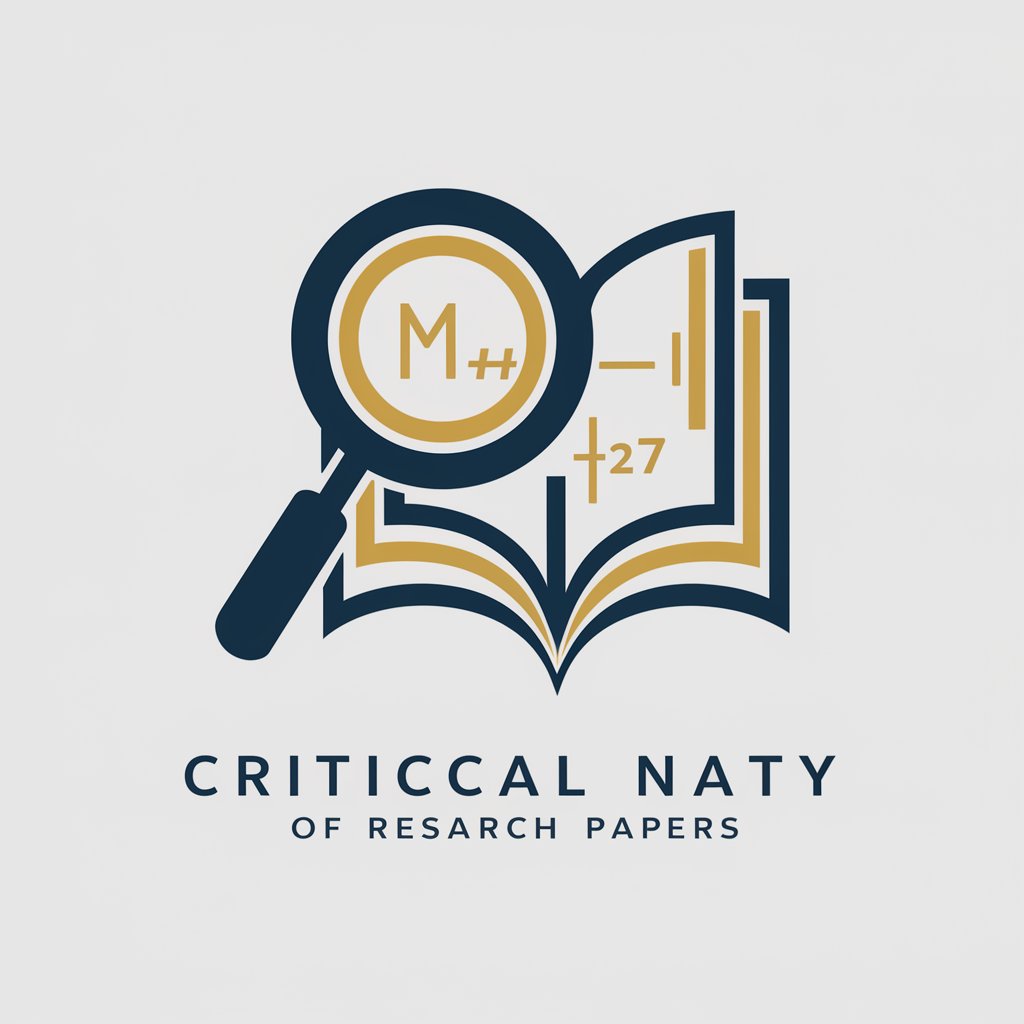Research-Paper Analyzer - Research Paper Evaluation Tool

Welcome! Ready to dive into some critical research analysis?
Simplifying Academic Analysis with AI Power
Critically evaluate the methodology used in the attached research paper.
Summarize the key findings and implications of the given study.
Identify the major contributions and potential impacts of the research.
Discuss the limitations and suggest future research directions based on the provided text.
Get Embed Code
Overview of Research-Paper Analyzer
Research-Paper Analyzer is designed as an expert academic tool to aid in the critical analysis and evaluation of research papers. Its primary function is to deconstruct complex academic papers into more digestible summaries, making the intricate details and findings of these papers accessible to a wider audience. This includes elucidating the paper's overall aim, methodology, key findings, implications, contributions, limitations, and potential future research directions. By doing so, it serves as a bridge between detailed academic research and users who require a concise yet comprehensive understanding of these studies. Powered by ChatGPT-4o。

Key Functions of Research-Paper Analyzer
Summarization of Research Papers
Example
Analyzing a complex biomedical study and summarizing its findings and implications for a non-specialist audience.
Scenario
Used by a medical journalist to accurately report on new research findings in layman's terms.
Identification of Key Elements
Example
Extracting and outlining the main methodologies, materials, and variables from a technical engineering paper.
Scenario
Assisting an engineering student in understanding the core aspects of a research paper for their academic project.
Evaluation of Contributions and Limitations
Example
Assessing the impact and shortcomings of a new study in environmental science.
Scenario
Used by researchers to identify gaps in the current study and potential areas for future research.
Target User Groups for Research-Paper Analyzer
Academic Researchers
Researchers can leverage this tool to quickly understand the essence of papers in their field or in new areas, helping them stay abreast of latest developments and identifying research gaps.
Students
Students at various levels can use this tool to break down complex papers into understandable segments, aiding in their learning and research projects.
Journalists and Science Communicators
This tool is valuable for journalists and communicators who need to translate dense academic content into accessible information for the general public.
Policy Makers and Analysts
Policy makers and analysts can use the tool to understand the implications of scientific research in shaping policies and making informed decisions.

How to Use Research-Paper Analyzer
Step 1
Visit yeschat.ai to access Research-Paper Analyzer for a free trial, no login or ChatGPT Plus subscription required.
Step 2
Upload or paste the text of the research paper you want to analyze.
Step 3
Specify particular sections of the paper or aspects you want to focus on, if any.
Step 4
Submit the text and wait for the analysis, which includes a critical evaluation and summary.
Step 5
Review the provided analysis, which will cover aspects like methodology, findings, and future research directions.
Try other advanced and practical GPTs
Tattoo designer
Craft Your Ink with AI Precision

Guess the GPT Image
Unlock Your Creativity with AI-Powered Guessing

El Abogado del Pueblo
Empowering Legal Excellence with AI

French Driver's License Guide for Foreigners
Navigate French driving license intricacies with AI.

Photo to Manga Transformer
Bringing Photos to Life with AI-Powered Anime Magic

ArtPrompt Master
Elevate Your Imagery with AI-Powered Precision

Past Meets Present
Bringing History to Modern Life

GCP Master
Empowering GCP Success with AI Expertise

Zoll GPT (DE)
Navigating Customs with AI Precision

Psychedelic Wisdom Advisor
Navigating Psychedelic Knowledge with AI

たぶん犬の超おもしろ動画紹介GPT
Discover the joy of dog videos with AI

Musho Logo
Craft Your Brand's Identity with AI

Frequently Asked Questions about Research-Paper Analyzer
What type of research papers can Research-Paper Analyzer evaluate?
Research-Paper Analyzer can evaluate a wide range of academic papers, including those in sciences, humanities, and social sciences.
How does the tool handle papers with complex scientific data?
It analyzes the data in the context of the paper's goals and methodologies, providing a simplified explanation of the results and their implications.
Can Research-Paper Analyzer help identify research gaps and limitations?
Yes, it critically evaluates the paper to identify any potential gaps in research or methodological limitations.
Is this tool useful for students and researchers at all levels?
Absolutely, it's designed to aid students, academicians, and researchers in understanding and evaluating research papers more efficiently.
Can the tool provide suggestions for future research directions?
Yes, based on the analyzed content, it can suggest potential future research areas related to the topic of the paper.
